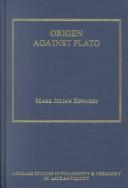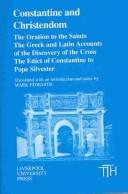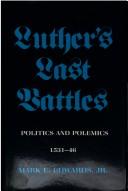| Listing 1 - 10 of 58 | << page >> |
Sort by
|

ISBN: 075460828X 0754613313 9780754608288 Year: 2002 Publisher: Aldershot Ashgate
Abstract | Keywords | Export | Availability | Bookmark
 Loading...
Loading...Choose an application
- Reference Manager
- EndNote
- RefWorks (Direct export to RefWorks)
Origen --- Plato --- Platonici --- Platoniciens --- Platonism --- Platonisme --- Platonists --- Platonists. --- Philosophers --- Philosophy, Ancient --- Adamantius, --- Oregenes Adamantius, --- Origene --- Origenes Adamantius, --- Origenes, --- Origenis --- Orygenes --- Ūrījānūs --- Origen.

ISBN: 0715635638 9780715635636 Year: 2006 Volume: *5 Publisher: London Duckworth
Abstract | Keywords | Export | Availability | Bookmark
 Loading...
Loading...Choose an application
- Reference Manager
- EndNote
- RefWorks (Direct export to RefWorks)
Book
ISBN: 9780199687725 0199687722 9780198785248 0198785240 0191815039 0191511498 0191511501 Year: 2015 Publisher: Oxford Oxford University Press
Abstract | Keywords | Export | Availability | Bookmark
 Loading...
Loading...Choose an application
- Reference Manager
- EndNote
- RefWorks (Direct export to RefWorks)
Religions of the Constantinian empire' provides a synoptic review of Constantine's relation to all the cultic and theological traditions of the Empire during the period from his seizure of power in the west in 306 CE to the end of his reign as autocrat of both east and west in 337 CE. Divided into three parts, the first considers the efforts of Christians to construct their own philosophy, and their own patterns of the philosophic life, in opposition to Platonism. The second assembles evidence of survival, variation or decay in religious practices which were never compulsory under Roman law. The 'religious plurality' of the second section includes those cults which are represented as demonic burlesques of the sacraments by Firmicus Maternus. The third reviews the changes, both within the church and in the public sphere, which were undeniably prompted by the accession of a Christian monarch. In this section on 'Christian polyphony', Mark Edwards expertly moves on from this deliberate petrifaction of Judaism to the profound shift in relations between the church and the civic cult that followed the Emperor's choice of a new divine protector. 0.
Religious pluralism --- Church history --- Church and state --- Pluralisme religieux --- Eglise --- Eglise et Etat --- Histoire --- Constantine --- Religion. --- Rome --- History --- Religion --- Church and state. --- Kyrkohistoria. --- Kyrkan och staten. --- Primitive and early church. --- Konstantin den store, --- 30-600 --- Rome (Empire) --- 27 "03" --- Kerkgeschiedenis--?"03" --- Religious life and customs. --- Christianity and state --- Separation of church and state --- State and church --- State, The --- Apostolic Church --- Christianity --- Church, Apostolic --- Early Christianity --- Early church --- Primitive and early church --- Primitive Christianity --- Fathers of the church --- Great Apostasy (Mormon doctrine) --- Constantijn, --- Constantin, --- Constantin --- Constantine, --- Constantino --- Constantinus Flavius Valerius Aurelius, --- Constantinus --- Constantinus, --- Costantino --- Costantino, --- Flaviĭ Valeriĭ Avreliĭ Konstantin, --- Flavius Valerius Aurelius Constantinus Augustus, --- Flavius Valerius Aurelius Constantinus, --- Flavius Valerius Constantinus, --- Konstantin, --- Konstantin --- Kōnstantinos, --- Kōnstantinos --- Konstantyn, --- Kostandianos --- Κωνσταντίνος, --- Флавий Валерий Аврелий Константин, --- Константин --- Константин, --- Flavije Valerije Konstantin --- Early Church Period --- Primitive and Early Church Period --- Church history - Primitive and early church, ca. 30-600. --- Church and state - Rome. --- Constantine - I, - Emperor of Rome, - -337 - Religion. --- Rome - Religion. --- Rome - History - Constantine I, the Great, 306-337. --- Constantine - I, - Emperor of Rome, - -337

ISBN: 0853236488 184631450X 9780853236481 Year: 2003 Volume: 39 Publisher: Liverpool Liverpool university press
Abstract | Keywords | Export | Availability | Bookmark
 Loading...
Loading...Choose an application
- Reference Manager
- EndNote
- RefWorks (Direct export to RefWorks)
Church history --- Eglise --- Sources. --- Histoire --- Sources --- Constantine --- Religion. --- Rome --- History --- 27 "03" --- Kerkgeschiedenis--?"03" --- Christianity --- Ecclesiastical history --- History, Church --- History, Ecclesiastical --- Constantijn, --- Constantin, --- Constantin --- Constantine, --- Constantino --- Constantinus Flavius Valerius Aurelius, --- Constantinus --- Constantinus, --- Costantino --- Costantino, --- Flaviĭ Valeriĭ Avreliĭ Konstantin, --- Flavius Valerius Aurelius Constantinus Augustus, --- Flavius Valerius Aurelius Constantinus, --- Flavius Valerius Constantinus, --- Konstantin, --- Konstantin --- Kōnstantinos, --- Kōnstantinos --- Konstantyn, --- Kostandianos --- Κωνσταντίνος, --- Флавий Валерий Аврелий Константин, --- Константин --- Константин, --- Flavije Valerije Konstantin --- Rim --- Roman Empire --- Roman Republic (510-30 B.C.) --- Romi (Empire) --- Byzantine Empire --- Rome (Italy) --- Church history - 4th century - Sources. --- Constantin empereur --- Constantine - I, - Emperor of Rome, - d. 337 - Religion. --- Rome - History - Constantine I, the Great, 306-337 - Sources. --- Constantine - I, - Emperor of Rome, - d. 337

ISBN: 0853236151 1846313643 9781846313646 9780853236153 9780853236151 Year: 2000 Volume: 35 Publisher: Liverpool Liverpool university press
Abstract | Keywords | Export | Availability | Bookmark
 Loading...
Loading...Choose an application
- Reference Manager
- EndNote
- RefWorks (Direct export to RefWorks)
These two texts are fundamental for the understanding not only of Neoplatonism but also of the conventions of biography in late antiquity. Neither has received such extensive annotation before in English, and this new commentary makes full use of recent scholarship. The long introduction is intended both as a beginner's guide to Neoplatonism and as a survey of ancient biographical writing.
Neoplatonism --- Plotinus --- Proclus, --- Neoplatonism. --- Néo-platonisme --- Proclo, --- Proclo di Atene, --- Proclo di Costantinopoli, --- Proclo Licio Diadoco, --- Proclus Arabus, --- Proclus Diadochus --- Proclus Diadochus, --- Proclus Lycius, --- Prokl, --- Prokl Diadokh, --- Proklos, --- Proklos Diadochos, --- Proklus, --- Πρόκλος, --- Πρόκλος Πλατωνικός Διάδοχος, --- Πρόκλος Διάδοχος, --- פרוקלוס --- Alexandrian school --- Church history --- Hellenism --- Philosophy --- Philosophy, Ancient --- Platonists --- Theosophy --- Plotinus. --- Plotin --- Plotinos --- Boluoding --- Iflūṭīn --- Plotino --- Plōtinos --- Plotinus, --- Plotyn --- Πλωτι̂νος --- פלוטינוס --- أفلوطين --- Proclus --- Proclus, - ca. 410-485
Book
ISBN: 9781138685048 9781315543512 1315543516 9781134856053 1134856059 9781134856121 1134856121 9781134855988 1134855982 9780367619121 Year: 2021 Publisher: London, Routledge
Abstract | Keywords | Export | Availability | Bookmark
 Loading...
Loading...Choose an application
- Reference Manager
- EndNote
- RefWorks (Direct export to RefWorks)
This volume offers the most comprehensive survey available of the philosophical background to the works of early Christian writers and the development of early Christian doctrine. It examines how the same philosophical questions were approached by Christian and pagan thinkers; the philosophical element in Christian doctrines; the interaction of particular philosophies with Christian thought; and the constructive use of existing philosophies by all Christian thinkers of late antiquity. While most studies of ancient Christian writers and the development of early Christian doctrine make some reference to the philosophic background, this is often of an anecdotal character, and does not enable the reader to determine whether the likenesses are deep or superficial, or how pervasively one particular philosopher may have influenced Christian thought. This volume is designed to provide not only a body of facts more compendious than can be found elsewhere, but the contextual information which will enable readers to judge or clarify the statements that they encounter in works of more limited scope. With contributions by an international group of experts in both philosophy and Christian thought, this is an invaluable resource for scholars of early Christianity, Late Antiquity and ancient philosophy alike.
Christian philosophy --- Philosophers. --- Philosophy, Ancient. --- Theology, Doctrinal --- Philosophical theology. --- History
Book
ISBN: 9781032093604 Year: 2021 Publisher: London : Routledge,
Abstract | Keywords | Export | Availability | Bookmark
 Loading...
Loading...Choose an application
- Reference Manager
- EndNote
- RefWorks (Direct export to RefWorks)
Christian philosophy --- Neo-Platonism. --- Neoplatonism. --- Neoplatonism. --- Néo-platonisme. --- Platonists. --- Platonists. --- Theology --- Theology --- Théologie --- History of doctrines --- Early church. --- History --- Histoire --- Aristotle. --- Aristotle. --- 30-600.
Book
ISBN: 9781137385857 1137385855 Year: 2015 Publisher: Houndmills, Basingstoke, Hampshire ; New York Palgrave Macmillan
Abstract | Keywords | Export | Availability | Bookmark
 Loading...
Loading...Choose an application
- Reference Manager
- EndNote
- RefWorks (Direct export to RefWorks)
"Citizenship is increasingly the core concept by which human belonging is defined but do we really understand what it is? This book develops an evolutionist argument to challenge accepted ideas about citizenship and question how well it fits between political prescriptions for sociality and human nature. Though citizenship reflects a dominant, enduring political model of belonging, it has been contested from a range of standpoints such as feminism, social exclusion and human rights. Using a novel Darwinian paradigm, Edwards exposes the limits of citizenship conceived in wholly or overtly political terms, and endorses the validity of citizenship struggles that implicitly and explicitly champion human belonging over political belonging."--
Book
ISBN: 9781915951991 Year: 2017 Publisher: London : LID Publishing,
Abstract | Keywords | Export | Availability | Bookmark
 Loading...
Loading...Choose an application
- Reference Manager
- EndNote
- RefWorks (Direct export to RefWorks)
Virtually everyone sells in some capacity today, and we can become better at selling by becoming smarter at it. In today's highly competitive marketplace, creating an advantage through sales is imperative. Distilled into this single, handy-sized volume are twenty tips, advice and techniques to help anyone to improve their sales capability. It provides insights and tools to develop a more considered, smarter approach to overcoming any sales-related problem and situation. Each piece of advice is accompanied by graphic aids to aid understanding.

ISBN: 9004068929 9789004068926 Year: 1983 Publisher: Leiden Brill
Abstract | Keywords | Export | Availability | Bookmark
 Loading...
Loading...Choose an application
- Reference Manager
- EndNote
- RefWorks (Direct export to RefWorks)
| Listing 1 - 10 of 58 | << page >> |
Sort by
|

 Search
Search Feedback
Feedback About UniCat
About UniCat  Help
Help News
News